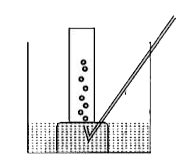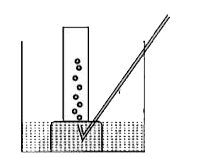Observe the following diagram and answer any four questions from (i) and (v) given below.
A metal is treated with dilute sulphuric acid. The gas evolved is collected by the method shown in the figure :
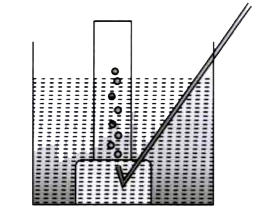
Identify the gas evolved.
Hydrogen gas
Carbon dioxide gas
Nitrogen gas
Sulphur dioxide gas
The correct Answer is:A
Step by step video, text & image solution for Observe the following diagram and answer any four questions from (i) and (v) given below. A metal is treated with dilute sulphuric acid. The gas evolved is collected by the method shown in the figure : Identify the gas evolved. by Chemistry experts to help you in doubts & scoring excellent marks in Class 10 exams.
Updated on:21/07/2023Topper's Solved these Questions
- NEW CHAPTERS AND QUESTIONS BASED ON LATEST TYPOLOGIES INTRODUCED BY CBSE FOR 2021-22 EXAMINATION BOOK - OSWAL PUBLICATIONCHAPTER - NEW CHAPTERS AND QUESTIONS BASED ON LATEST TYPOLOGIES INTRODUCED BY CBSE FOR 2021-22 EXAMINATION EXERCISE - METALS AND NON- METALS (SELF ASSESSMENT) (OBJECTIVE TYPE QUESTIONS) (A. Multiple Choice Questions)
3 Videos
- NEW CHAPTERS AND QUESTIONS BASED ON LATEST TYPOLOGIES INTRODUCED BY CBSE FOR 2021-22 EXAMINATION BOOK - OSWAL PUBLICATIONCHAPTER - NEW CHAPTERS AND QUESTIONS BASED ON LATEST TYPOLOGIES INTRODUCED BY CBSE FOR 2021-22 EXAMINATION EXERCISE - METALS AND NON- METALS (SELF ASSESSMENT) (OBJECTIVE TYPE QUESTIONS) (B. Assertion and Reason Type Questions)
2 Videos
- NEW CHAPTERS AND QUESTIONS BASED ON LATEST TYPOLOGIES INTRODUCED BY CBSE FOR 2021-22 EXAMINATION BOOK - OSWAL PUBLICATIONCHAPTER - NEW CHAPTERS AND QUESTIONS BASED ON LATEST TYPOLOGIES INTRODUCED BY CBSE FOR 2021-22 EXAMINATION EXERCISE - CHEMICAL REACTIONS(VISUAL CASE - BASED QUESTIONS )
11 Videos
- METALS AND NON-METALSBOOK - OSWAL PUBLICATIONCHAPTER - METALS AND NON-METALSEXERCISE - Board corner(Long answer type questions)
20 Videos
- NTSE 2019 - 20 BOOK - OSWAL PUBLICATIONCHAPTER - NTSE 2019 - 20 EXERCISE - (CHEMISTRY) ATOMS AND MOLECULES (STAGE - 2)
1 Videos
Similar Questions
Knowledge Check
Observe the following diagram and answer any four questions from (i) and (v) given below.
A metal is treated with dilute sulphuric acid. The gas evolved is collected by the method shown in the figure :
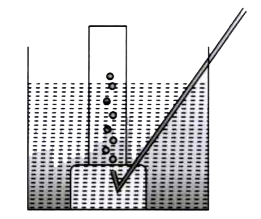
How will you test for the gas evolved ?ABring a glowing splint near test tube, it will reignite.BPlace moist litmus paper in a test tube of this gas, it turns red.CBring a burning splint near the opening of a test tube containing this gas, a popping sound occurs.DUsing universal litmus solution.Observe the following diagram and answer any four questions from (i) and (v) given below.
A metal is treated with dilute sulphuric acid. The gas evolved is collected by the method shown in the figure :
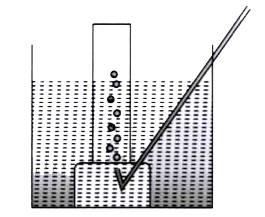
An industrial use of the gas evolved is :AIn paints and varnishesBIn making of gold jewelleryCTo join railway tracks or cracked machine partsDAs fuel in rocketsObserve the following diagram and answer any four questions from (i) and (v) given below.
A metal is treated with dilute sulphuric acid. The gas evolved is collected by the method shown in the figure :
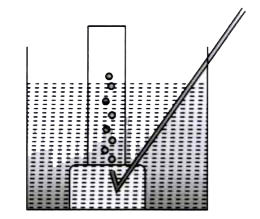
If the metal used above is zinc then the chemical equation for the evolution of gas is :AZn(s)+H2SO4(dil)→ZnSO4(aq)+H2(g)↑⏐B2Zn(s)+H2SO4(dil)→2ZnSO4(aq)+H2(g)↑⏐C2Zn(s)+2H2SO4(dil)→ZnSO4(aq)+2H2(g)↑⏐D2Zn(s)+2H2SO4(dil)→2ZnSO4(aq)+2H2(g)↑⏐
A metal is treated with dilute sulphuric acid. The gas evolved is collected by the method shown in the figure:
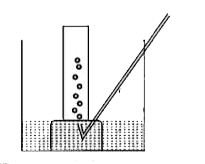
What nature of hydrogen is used as a fuel in rocket ?
View SolutionObserve the following diagram and answer any four questions from (i) and (v) given below.
A metal is treated with dilute sulphuric acid. The gas evolved is collected by the method shown in the figure :
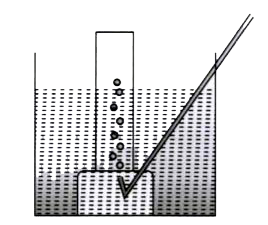
Which of the following statement is correct about the gas ?
View SolutionWhen copper is treated with dilute nitric acid, the gas evolved is
View SolutionObserve the following diagram and answer any four questions below:
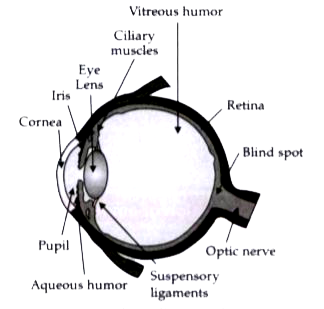
What does the given diagram show?
View SolutionObserve the following diagram and answer any four questions below:
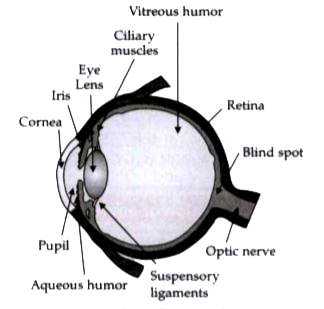
_______ controls the amount of light entering the eye.
View Solution

